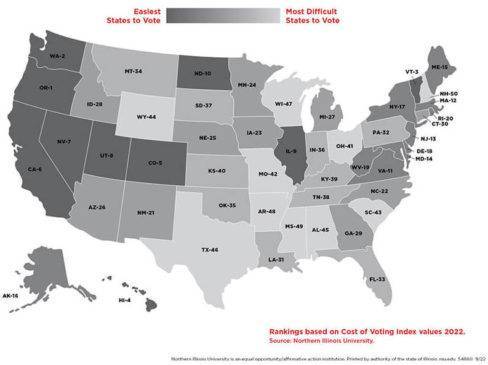The ease of voting across the United States
For help in voting visit our Voting Resources page.
A new study from Northern Illinois University identifies the U.S. states easing barriers for voters to get and stay registered to vote and cast a ballot on Election Day. The rankings were updated from their Cost of Voting Index published in 2020.
The eight states that rank the easiest to vote are Oregon, Washington, Vermont, Hawaii, Colorado, California, Nevada and Utah. All have enacted an all vote-by-mail process.
In 2021 alone, 19 states passed at least 33 new laws that added barriers to voting. There were 25 states that passed 62 laws making voting more accessible. False claims of voter fraud being stoked by former President Trump resulted in states taking a step backward by making voting more restrictive in the 19 states.
 The authors Cost of Voting Index uses an assemblage of dozens of current election laws to rank each state. States are ranked according to the time and effort it takes to vote in U.S. elections. Both stages of the voting process — registering to vote and casting a ballot — are combined into a single index value.
The authors Cost of Voting Index uses an assemblage of dozens of current election laws to rank each state. States are ranked according to the time and effort it takes to vote in U.S. elections. Both stages of the voting process — registering to vote and casting a ballot — are combined into a single index value.
According to Northern Illinois University Professor Scot Schraufnagel who led the study the most challenging states to vote are New Hampshire (50th) and Mississippi (49th). “Their failure to move up in the rankings is largely due to failing to keep pace with reforms like online voter registration, automatic voter registration and no excuse absentee voting,” Schraufnagel said.
States that fell from the 2020 study were Wisconsin (38th to 47th), Florida (28th to 33rd), Georgia (25th to 29th) and Iowa (19th to 23rd). Florida and Iowa have not adopted an automatic voter registration. Georgia maintains strict enforcement of a photo identification law for balloting and bans food and water distribution to people waiting in line to vote.
Wisconsin, a swing state, requires proof of residency with their registration application. They also no longer sanction special voter-registration deputies who previously conducted voter registration drives. The state also strictly enforces its photo ID law and has no provision for pre-registration of young potential voters.
Iowa, Florida and Georgia eliminated ballot drop-off locations or the convenient drop boxes used during the 2020 election cycle. They have laws restricting who can turn in an absentee ballot for someone else. In the aftermath of the 2020 election Iowa, Florida and Georgia codified that they will not allow state citizens permanent absentee voter status.
Arkansas, which dropped from 40th to 48th, passed laws that created greater restrictions and added barriers to vote. Arkansas refused to pass other laws that make voters’ access to the polls easier.
Read the Cost of Voting in the American States: 2022 here.
About NIU
Northern Illinois University is a nationally recognized public research university. Its expertise benefits its region and spans the globe in a wide variety of fields. These include the sciences, humanities, arts, business, engineering, education, health and law. NIU offers more than 100 areas of study.
